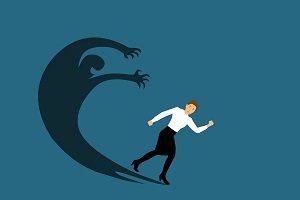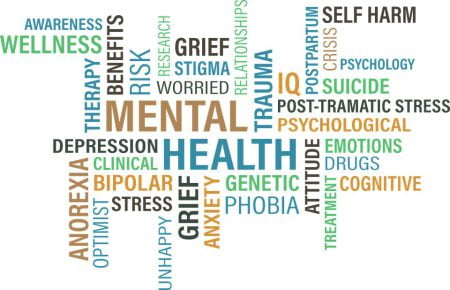Different Types of Phobias
- Updated on: Jul 5, 2024
- 6 min Read
- Published on Apr 11, 2020

What Does Phobia Mean?
A phobia is a type of anxiety disorder in which there is a persistent, excessive and irrational fear reaction.
A person having a phobia either tries to avoid the thing that triggers the fear, or encounters it with great anxiety and distress. The person may not experience phobia until he/she comes in contact with the source of the fear. The fear can be of a specific place, situation, or object.
The impact of a phobia can range from irritating to severely disabling. People with phobia find that their fear is excessive and unrealistic but they can’t help anything about it. Such fears can interfere with their work, school, office and personal relationships.
Phobias often start in children or teens, and continue into adulthood.
Approximately, 19 million people in United States have a phobia that causes difficulty in some way in their lives. You should consult your doctor if you have a fear that prevents you from leading your fullest life.
Symptoms of Phobia
The symptoms of phobias may include:
- Excessive and irrational fear of an object or situation
- Avoiding the object or fearful situation
- Facing the fearful situation with great distress
- Anxiety or a panic attack symptoms such as sweating, diarrhea, trembling or shaking, increased heartbeat problems with breathing (shortness of breath), feeling dizzy and sometimes unconsciousness.
What are the Different Types of Phobias?
There are majorly 3 types of phobias:
Specific Phobia
It is also termed as simple phobia. People with specific phobia, may have fear of specific animals (such as dogs, snakes), people (such as clowns and doctors), places (such as dark places, hill stations) or situations (such as flying in a plane, and lightening).
These conditions may be partly genetic (inherited) and seem to run in families.
Some unusual specific phobias may include alektorophobia (fear of chickens), onomatophobia (fear of names), pogonophobia (fear of beards), nephophobia (fear of clouds), cryophobia(fear of ice or cold).
Social Phobia
People with social phobia may fear from social places where they may feel humiliated, and embarrassed. These types of people specially become panic when unknown people are involved.
The fear may hinder their performances when they have to present a lecture, and business presentation. People who have a shy nature since their childhood and who have some negative social experiences in childhood are mostly found with this phobia.
Agoraphobia
Agoraphobia is the fear of being in places where a person finds one difficult in and sometimes may also feel embarrassed to make a quick exit.
These types of people mostly avoid going to a movie, riding over a bus or train and attending conferences. People with agoraphobia likely develop anxious and panic symptoms like trembling, sweating etc.
According to a 1998 survey of more than 8,000 respondents published in the British Journal of Psychiatry Trusted Source, it was found that some of the most common phobias include.
Acrophobia
Acrophobia refers to a fear of heights. You might feel dizzy, increased sweating, chest pain or tightness, shaking and trembling when faced with heights and increased heartbeat.
The cause of acrophobia may develop in response to a traumatic experience of falling from heights.
Aerophobia
Aerophobia refers to the fear of flying either in helicopters and airplanes and other flying vehicles. Specifically, there is no cause of aerophobia but it is believed that excessive exposure to media that shows plane crashes and other flight related incidents may play a role.
Astraphobia
Astraphobia refers to the abnormal fear of thunder and lightning. This phobia can develop in both humans and animals.
Symptoms of astraphobia may include: panic attacks that may include sweating, shaking, nausea and crying, before or during a storm.
Autophobia
Autophobia refers to the fear of being alone. People with autophobia find it difficult to being alone, even in their own comfortable places like home. It can cause them to develop anxiety and panic attack.
Claustrophobia
Claustrophobia is a type of situation phobia which is caused due to a fear of crowded and closed spaces.
The phobia may occur to such people who encountered situations like getting stuck in a crowded elevator, locked in a room without window, or driving on a heavy traffic highway.
Hemophobia
Hemophobia refers to the abnormal and persistent fear of blood. Hemophobia may occur in people who have a previous negative experience with blood.
People who have gone through a traumatic injury or illness that leads to a major loss of blood may be at an increased risk.
Hydrophobia
Hydrophobia is the fear of water in which there is an excessive fear of something which cannot harm the person in real.
People with this type of phobia may fear from any source of water like a bath tub, river and an ocean.
Ophidiophobia
Ophidiophobia is the fear of snakes. If you have this phobia, you may even be unable to look at photographs or videos in which snakes appear.
If you have mild ophidiophobia, you may fear with large or venomous snakes. If your phobia is more severe, you may fear from smaller snakes as well.
Zoophobia
Zoophobia refers to the fear of dangerous and life threatening animals. Usually zoophobia cases are mostly found in females.
A person can develop zoophobia if he/she was ever attacked or hurt by animals, or saw someone else in such a condition.
List of Phobias
| Achluophobia | Fear of darkness |
|---|---|
| Acrophobia | Fear of heights |
| Algophopia | Fear of pain |
| Arachnophobia | Fear of spiders |
| Amathophobia | Fear of dust |
| Ailurophobia | Fear of cats |
| Agarophobia | Fear of public place |
| Bibliophobia | Fear of books |
| Barophobia | Fear of gravity |
| Chromophobia | Fear of colors |
| Dendrophobia | Fear of trees |
| Emetophobia | Fear of vomiting |
| Genophobia | Fear of sex |
| Ochlophobia | Fear of crowds |
| Ornithophobia | Fear of birds |
| Pnigophobia | Fear of choking |
| Pteronophobia | Fear of feathers |
| Pyrophobia | Fear of fire |
| Trycophobia | Fear of holes |
| Venustraphobia | Fear of beautiful women |
| Wiccaphobia | Fear of witches and witchcraft |
| Xenophobia | Fear of strangers |
How Do Doctors Diagnose Phobias?
If a doctor suspects that you may have a phobia, you will likely be asked a number of questions for the doctor to explore all the symptoms you are having. You may need to have a medical interview and physical examination.
A phobia may develop along with a number of other mental-health problems, including schizophrenia, obsessive-compulsive disorder (OCD), depression, and substance-abuse disorders.
Treatment Options for Phobias
Usually, psychotherapy and medications are preferred as a treatment for phobia. The treatment particularly includes:
- Desensitization is a mental-health therapy that involves the regulated exposure of the person with phobias to situations that are increasingly similar to the ones they are experiencing while having phobia. These situations can either include actual or computer-generated anxiety-provoking stimuli.
- Cognitive behavioral therapy (CBT) helps the phobic patient to relieve from symptoms by changing their pattern or way of thinking about their phobia.
- Medications when used in combination with talk therapies like desensitization and CBT are most effective in treatment. The medications for phobia are usually given to increase the levels of serotonin in the brain. Examples of these medications include fluoxetine (Prozac), paroxetine (Paxil), fluvoxamine (Luvox), sertraline (Zoloft), citalopram (Celexa), vortioxetine (Brintellix), escitalopram (Lexapro) and vilazodone (Viibryd).
- Phobias can also be treated by beta-blocker medications, which decrease the physical symptoms associated with panic by blocking the effects that adrenaline (epinephrine) has on the body. One example of a beta-blocker is propranolol.
- Phobia can also be treated with drugs in a medication class called benzodiazepines or minor tranquilizers. Examples of medications from that group include diazepam (Valium), lorazepam (Ativan), and clonazepam (Klonopin).
How Can People Cope With Phobias?
There are some ways that individuals with a phobia can work toward overcoming their fears such as talking about their phobias, imagining themselves facing their fears (visualization), and making positive statements to themselves.
In fact, when self-help methods are combined with psychotherapy, phobia patients may achieve significant improvement in symptoms.
FAQs
What is the Most Dangerous Phobia?
Necrophobia is among the most dangerous phobias. Necrophobia refers to the fear of death and it usually develops as a result of many other phobias like nyctophobia (fear of darkness), acrophobia (fear of height), claustrophobia (fear of crowded places) and zoophobia (fear of animals).
What are the Causes of Phobia?
There are some genetic and environmental factors that can cause phobias. Children who have one of their parents with an anxiety disorder are at risk of developing a phobia. Some distressing events, such as nearly drowning, flight crashing can bring on a phobia. Long exposure to confined spaces, extreme heights, and animal bites can all be sources of phobia.
Can Phobias be Cured?
All phobias can be successfully treated and managed. There are some therapies and medications which can be used for the treatment. The therapies include densensitization or exposure therapy and cognitive behavioral therapy. Specific medications which are usually recommended by the doctors are beta blocker agents like propranolol and drugs which increase the level of serotonin like paroxetine (Paxil), fluvoxamine (Luvox) and sertraline (Zoloft) citalopram (Celexa). For some cases, sedatives are also recommended but these are mostly avoided as people become habitual of these drugs.
Do Phobias get Worse With Age?
No, phobias usually improve with age because as you get older, you produce much less adrenaline (the fight or flight hormone). But if your phobia has anything to do with being vulnerable, such as heights or big crowds, it can probably get worse with age.












